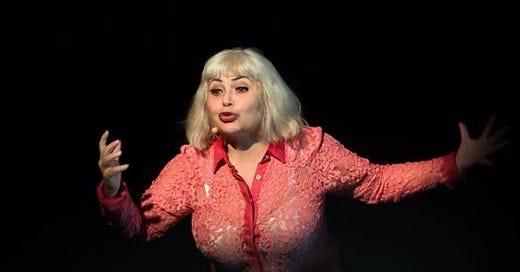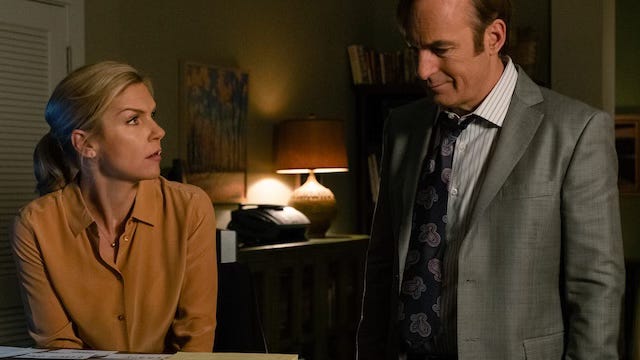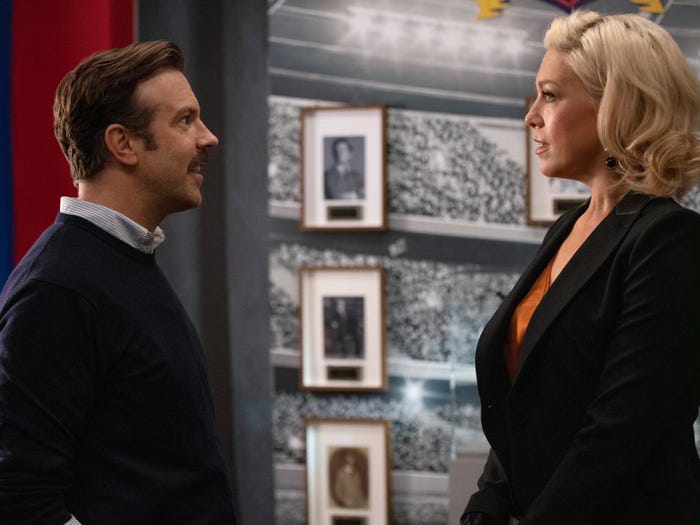Reviews: Penny Arcade, 'Better Call Saul', 'Ted Lasso'
Some surprisingly offbeat theater and TV series offer a respite from life's harsher realities with no dumbing down of the stakes at play
(Sunday, March 24, 2024) CATSKILL, N.Y. – The inimitable Penny Arcade brought the curtain down on Bridge Street Theatre’s monthlong SoloFest this weekend with her Longing Lasts Longer program. She also brought down the house with her astutely outrageous 70-minute spoken-word rant with music and her highly personal performance style, an ingenious, carefully crafted blend of informality belying the intricate nature of her show combining informality, intimacy, dance, audience interaction, and astute cultural commentary.
Penny joked at one point that her show might have come with a “content note,” the new phrase that replaces “trigger warning,” which apparently has been cancelled (according to her). This joke allowed Penny to deconstruct the thought-police aspect of cancel culture, just one of the many bugaboos she tore apart in her rant that at times came off as hysterically funny standup comedy, a TED talk, and an academic lecture. These targets ranged from the clusters of people blocking New York City sidewalks, the mall-ification of that city, the perils of social media, the dangers of Orwellian groupthink, and the difference between longing and nostalgia – always with a wink and a smile, even though, as she noted, satire and irony are pretty much lost arts, if not dead and buried, along with so much else that has been lost in the homogenization of American culture, most essentially the ability to think critically and independently, to make decisions based upon a sense of one’s own authenticity rather than based upon what the advertising and media complex sell to Americans as their dream life, one which by design can never be fulfilled.
Working with her longtime creative partner Steven Zehentner, Penny’s show came with a pitch-perfect soundtrack of carefully chosen bits of pop, rock, and soul music that served as commentary and counterpoint to the text. The music -- including heavy doses of Beatles, Lou Reed, Patti Smith, Radiohead, and other music, most of it emerging from the 1970s downtown New York scene -- could be enjoyed simply on its own merits. But Penny and Steve’s expert curation made even such trivial fluff as ELO’s “Livin’ Thing” sound profound when juxtaposed against Penny’s acute and penetrating observations about what ails us and why.
For no good reason I only recently caught up with the TV series Better Call Saul, which began its six-season run in early 2015 and concluded (on what to me was a puzzling note) in summer 2022. It was worth the wait. This black comedy/crime drama/legal thriller and romantic comedy all in one must be considered among the all-time great TV shows, alongside Twin Peaks, The Sopranos, The Wire, and its sort-of origin show, Breaking Bad.
First, to clear up one all-too-common misunderstanding, while the title character of Better Call Saul was first introduced to the viewing public as a secondary character in Breaking Bad, the series functions entirely independent of the latter, meaning you don’t have to have seen or even have liked Breaking Bad to fully enjoy Better Call Saul. In creating the new series, the makers of Better Call Saul gave the lead character – who goes by several names, including Saul Goodman and Jimmy McGill – gave Saul, played to perfection by Bob Odenkirk, a fully rounded and complete backstory, making him a complex, troubled, but ultimately lovable character. Right there with him all the way is his romantic and sometimes professional partner, Kim Wexler, played by Rhea Seehorn, who almost serves in the role of viewer, just as entranced as we are by McGill/Goodman’s outrageous, larger-than-life, deliciously dangerous behavior.
I don’t want to give away any spoilers, so I will avoid going into any depth about the story, other than to say that there are actually at least three separate plotlines that intermingle and dance with each other but that are as compelling on their own as the primary story of Jimmy McGill. The story of a Mexican drug cartel focuses closely on the ambivalent character of Ignacio “Nacho” Vargo (Michael Mando), and the character of Mike Ehrmantraut is brilliantly played by Jonathan Banks, a former police officer who, when we meet him, is working as a parking lot attendant and who somehow finds himself entangled in all the various plotlines, including his own considerable screen time as a father-in-law and grandfather.
Ted Lasso
Another show that took me quite a while to catch up with was Ted Lasso. I’m not a big sports fan, so the idea of watching a TV series about a soccer team was not a big selling point (although English Premiere League football, particularly North London’s Arsenal, is one of two professional sports teams I do follow with some ardency, the other being the New York Mets, as I have written about elsewhere). Prodded, however, by a British friend who is even less of a sports fan than I am, I took the plunge and tuned into Ted Lasso, and what a treat that was.
In some ways Ted Lasso is a very old-fashioned ensemble comedy. Jason Sudeikis plays the title character, an American college football coach plucked from semi-obscurity to coach a fictional Premier League soccer team. Sudeikis knows next to nothing about soccer, but quickly finds his easygoing leadership instincts go a long way to serve him as an inspirational coach. It helps that he is surrounded by other team executives, assistant coaches, and some players who readily fill the gaps in his knowledge of the intricacies of the game, leading to some surprising developments on the field.
But the series is less about what happens on the field than the multiple web of relationships among the team’s executives – particularly its owner, Rebecca Welton, played by the phenomenal (and totally new to me) Hannah Waddingham, who nearly steals the show from Sudeikis – as well as intrigues among players and their girlfriends (or, in a few cases, boyfriends), families, other team owners, pub regulars, and fans. The series is also old-fashioned in that it has a beating, almost sentimental heart, even when some of the darker characters are at the center of the action.
Ted Lasso bears some structural similarities to The Office crossed with the philosophical meanderings of Seinfeld. For me, it came at a time when I had burned myself out on my once-beloved crime dramas and was in need of lighter but no less compelling fare. It was a welcome tonic, and again, you need care nothing about soccer or football or sports in order to enjoy Ted Lasso any more than you needed to care about hotel management to laugh along with Schitt’s Creek.
Hey, did you like this edition of Everything Is Broken? If so, please consider clicking on the “LIKE” button at the very end of this message. It matters to the gods of Substack.
Roll Call: Founding Members
Anne Fredericks
Anonymous (7)
Erik Bruun
Nadine Habousha Cohen
Fred Collins
Fluffforager
Benno Friedman
Amy and Howard Friedner
Jackie and Larry Horn
Richard Koplin
Paul Paradiso
Steve and Helice Picheny
David Rubman
Spencertown Academy Arts Center
Elisa Spungen and Rob Bildner/Berkshires Farm Table Cookbook
Julie Abraham Stone
Mary Herr Tally






